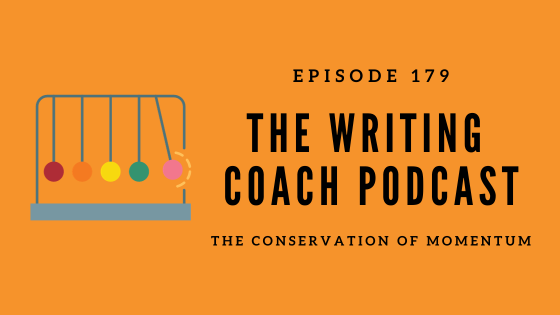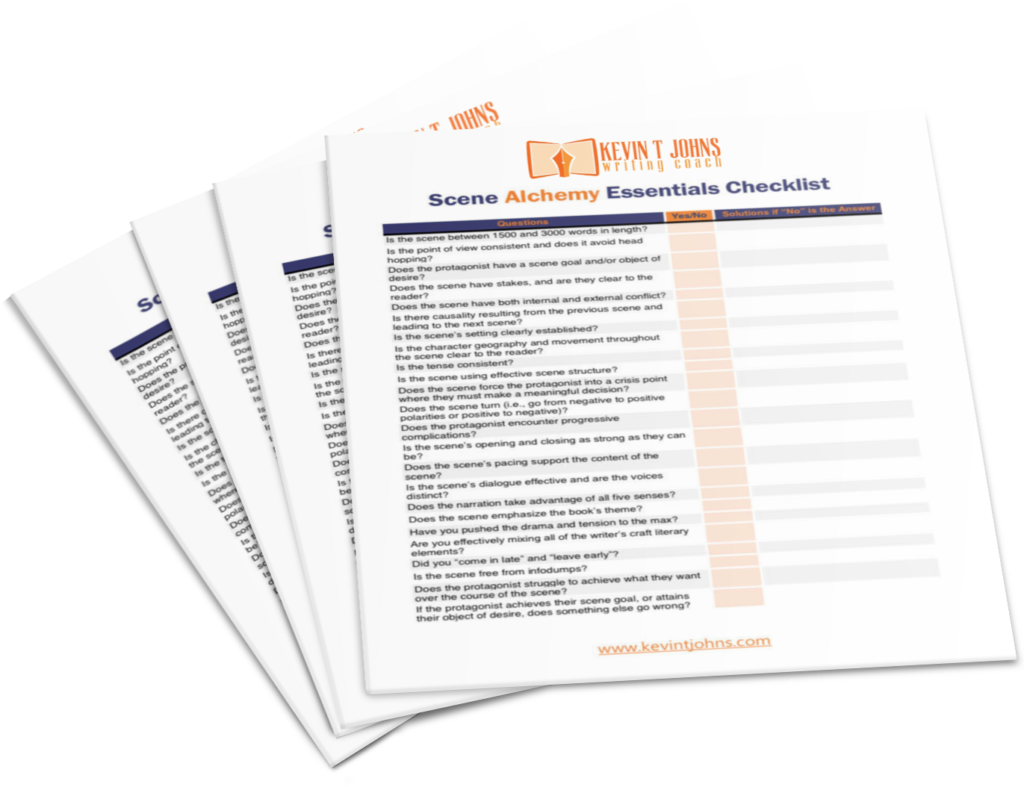The principle of the conservation of momentum is important in physics because it is a key quantity that helps describe and predict the motion of objects. That said, it is also a hugely important principle in the world of imagination, creative output, and productive writing.
We previously discussed the power of momentum in episode 151; now, thirty episodes later, we return to this ever-important topic.
Listen now!
The Writing Coach Episode #179 Show Notes
Download the FREE Scene Alchemy Essentials Checklist Now!
The Writing Coach Episode #179 Transcript
Podcast: Play in new window | Download
Subscribe: Apple Podcasts | RSS
Hello, beloved listeners, and welcome back to The Writing Coach podcast. I’m your host, as always, Writing Coach Kevin T. John’s here.
Have you picked up the Scene Alchemy Essentials Checklist yet? It’s waiting for you over at my website, www.kevintjohns.com/alchemy. The checklist is a simple compilation of about 25 questions that can be asked about any scene to help transform it into literary gold. It’s a gift for you, so head on over and pick it up—it’s a key component of the revisions process.
Now, it always bothers me when bloggers and podcasters say, “Oh, I know I haven’t blogged in a while” or “I know I haven’t podcasted in a while.” I know from your end, you don’t know, right? Maybe you’re even listening to this years later, and there’s been no break between the last episode and this one. But let me clue you in—there has been several weeks since I last posted an episode. It’s a bit strange because I’ve been consistent, hitting that weekly mark since last March. However, in the last few weeks, I haven’t maintained that consistency, and I want to talk about why, as it pertains to writing.
A few weeks ago, or a few episodes ago, I mentioned JK Rowling, as I often do for various reasons. However, a friend and fellow author emailed me, suggesting that I might want to distance myself from Rowling due to her divisive stance on trans issues and her social media controversies. This prompted me to reflect on the matter, leading me to record an entire podcast episode discussing the challenge of separating authors from their work and the need to navigate cancel culture thoughtfully.
After investing time and emotion into preparing the episode, I had second thoughts. I decided to check what Rowling had been posting on social media, and it became apparent that my friend’s advice was valid. Rowling’s recent posts revealed a stance and behavior that I couldn’t align with, making it challenging to disassociate the author from her art. Consequently, the episode never saw the light of day, and that week had no podcast.
The subsequent week, when it came time to record a new episode, I found myself lacking energy and inspiration. The momentum I had built was disrupted by the abandoned episode, and I struggled to regain my creative rhythm. Two weeks went by, and by the third, I found myself inadvertently in the habit of not producing episodes.
This experience highlighted the importance of creative momentum, a topic we’ve touched on before in episode 151. The gap in podcasting emphasized the profound power of momentum. Starting anew is challenging, whether it’s in the gym, asking someone on a date, or working on your writing. The difficulty lies in moving from zero to being up and running. However, once that momentum is established, maintaining it becomes significantly easier.
Let’s delve into physics for a moment. While I must admit my expertise lies in English literature rather than physics, I believe in exploring the principle of conservation of momentum. This fundamental concept in physics posits that the total momentum of a closed system remains constant if no external forces act on it. Drawing a parallel to my podcast, it was cruising smoothly week after week, functioning as a closed system with positive momentum. However, the JK Rowling controversy acted as an external force, disrupting the forward momentum and veering me off course. Consequently, the podcast lost its momentum, and I found myself lacking the energy or interest to create episodes in the last couple of weeks.
Momentum is often used as a metaphor, especially in discussions about creative work. It represents the strength or force gained by a person or project through continuous effort. In finance, momentum is discussed in terms of stocks, reflecting the tendency to persist in a certain direction. This concept is crucial for predicting the motion of objects, economies, or creative projects. If you consistently work on your book or publish podcasts, the momentum suggests you’ll likely continue. Conversely, when you stop, a new trend line emerges, leading in the direction of not working.
Regular writing schedules and habit formation play a significant role in maintaining creative momentum. Habits help overcome resistance and the energy required to start a task. Establishing a routine, such as writing on specific days and times, ingrains the habit, eliminating the need to psych yourself up. It’s crucial to get back on track after missing a writing session to prevent the formation of a new momentum—one that leans toward not creating. Keeping a streak going feels good, providing the positive reinforcement necessary to sustain creative momentum.
Getting an endorphin rush after a productive writing session is a feeling many of us cherish. Celebrating these small victories becomes crucial, especially in the context of novel writing—a long-term project that may take at least a year before reaching readers’ hands. Waiting for the eventual success at a book launch or the influx of sales revenue is a distant prospect. Therefore, recognizing and celebrating small wins is vital to sustaining momentum.
One strategy I advocate for maintaining momentum is adopting a four-act structure in storytelling, as opposed to a three-act structure. Finishing each act presents an opportunity to celebrate progress and infuse positive vibes into the project. Chunking down a book or any creative endeavor into manageable portions and celebrating achievements at each step contributes to the overall momentum. This approach provides more opportunities for encouragement and aids in avoiding the lulls associated with longer stretches of work.
Consistency and habit formation play a pivotal role in supporting productivity. A regular writing routine or podcasting schedule establishes a flow state, making progress feel natural. This consistency also benefits creativity. Contrary to the common belief that creative inspiration is finite, creativity fills from below. The more creative work undertaken, the more imagination is generated. Waiting for inspiration to rain down becomes unnecessary; instead, the act of creating itself replenishes the well of creativity.
Regular creation also facilitates continuous improvement. Lessons learned in one session can be applied and refined in subsequent sessions. Conversely, breaks in momentum lead to a loss of continuity, making it challenging to remember recent lessons and progress. Steady, regular work allows for better retention of lessons learned, contributing to overall improvement.
This episode serves as a reminder of the importance of perseverance and continuity. Even if a creative endeavour doesn’t see the light of day, the act of creation itself is a valuable lesson. The road to continued creation, production, and sharing of insights is a journey marked by progress. The key takeaway is to stay consistent, maintain momentum, and allow creativity to fill from below.
If you’re looking for assistance with your creativity, check out www.kevintjohns.com/alchemy for the Scene Alchemy Essentials Checklist—a valuable tool for enhancing your creative process. The Scene Alchemy Essentials Checklist proves to be a great tool, especially when you find yourself in the revision stage. Whether you’re just starting the revision process, grappling with how to enhance a scene, or if you’ve revisited it multiple times and feel you’ve exhausted your improvement efforts, this tool comes to your rescue. In both scenarios, the checklist provides you with the ability to analyze your scene with a fresh perspective. It empowers you to make those subtle yet impactful tweaks—momentum-building adjustments that elevate the quality of your scene. As you navigate the intricacies of the revision stage, this tool becomes your guiding companion, offering a structured approach to scene improvement. Its effectiveness lies in its capacity to unveil new insights and opportunities for refinement, even when you feel you’ve scrutinized the scene from every angle.
And with that, we wrap up this week’s episode. Thank you sincerely for tuning in—it’s always a pleasure to connect with you in this way. Don’t forget to hit that subscribe button, ensuring you won’t miss the next episode of The Writing Coach.


